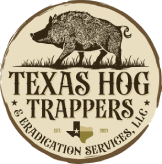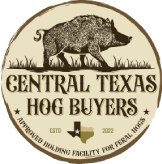Safe Removal &
Relocation of Feral Hogs

With an estimated population in excess of 2 million, Texas is home to the largest feral hog population in the United States. Despite widespread control measures adopted by the government, the population continues to grow as hogs are capable of reproducing at rapid rates.
We offer professional feral hog removal in East Texas, specializing in personalized control and removal measures for all rural and urban settings. Our hog trapping services include a detailed site investigation followed by setting up a corral for the safe and effective removal and relocation of these animals.
Damage to Property
Feral hogs dig up soil vigorously in search of food and are known to cause great extensive damage to agricultural fields, gardens, lawns, and landscapes. They are also capable of damaging water retention and drainage areas.
According to government statistics presented in 2008, feral hogs cause property damage amounting to $800 million per year in the United States.
Aggressive Nature
Feral Hogs are known for their aggressive nature, especially during the mating season and while protecting their young ones. If threatened, feral hogs charge at full speed and are capable of causing severe injuries to humans with the impact of their thick and hard skull.
Females charge with an open mouth and often bite, causing lacerations. While most attacks are treatable, fatalities have also been reported.
Transmission of Diseases
In addition to causing property damage and injuries, feral hogs also transmit several dangerous diseases and pose a major threat to livestock. They are known to carry and transmit pseudorabies, swine brucellosis, tuberculosis, anthrax, and tularemia.

Pseudorabies
Pseudorabies is a viral disease of the central nervous system commonly affecting domestic and wild animals, from cattle, horses, sheep, goats, cats, and dogs to raccoons, skunks, and small rodents.

Anthrax
Feral Hogs are known to transmit anthrax and also harbor parasites such as hog lice, ticks, and endoparasites, including worms and flukes. Recognized endemic areas of anthrax cases in feral hogs include portions of Texas, Louisiana, California, Arkansas, Mississippi, Nebraska, South Dakota, and small areas in other states.


